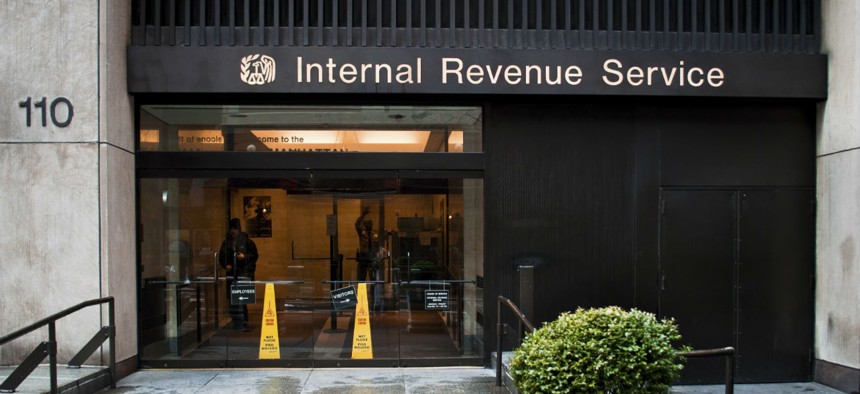
By Andrew F. Kazmierski / Shutterstock.com
Report: IRS Should Have an Official In Charge of Customer Experience
The agency could also improve its website and share more feedback, analysts conclude in first-of-its-kind report.
While the Internal Revenue Service received high customer satisfaction ratings in 2018, the agency can improve its website, share more feedback with the public and designate an executive to lead customer experience, according to a report.
On Tuesday at an annual summit, the nonprofit Partnership for Public Service and Accenture Federal Services, released a first-of-its-kind report on customer experience with the federal government. The IRS, with which almost every taxpayer interacts at least once a year, was one of the government’s highest-volume service providers profiled in the report.
The Partnership and Accenture highlighted several positives about customers's experience with the IRS. They reported that about 90% of customers were satisfied with their service via phone or a tax assistance center in fiscal 2018. Wait time to speak with an IRS representative decreased from 30 minutes in 2015 to seven minutes in 2018, and taxpayers can easily check the status of their refunds on the IRS’s website.
Additionally, the IRS instituted a “proactive communications campaign” to make sure implementation of the 2017 Tax Cuts and Jobs Act didn’t affect customer service during the 2019 filing season. The agency provided consistent information on frequently asked questions and partnered with professional tax preparers to ensure they understood the reforms.
“It's our responsibility to give back,” IRS Commissioner Charles Rettig said at the summit. “We’re flipping the terminology from service to experience” by offering services in multiple languages, having a workforce that reflects the people they serve and ensuring the agency modernizes, yet doesn’t ignore taxpayers without smartphones or broadband access.
Despite the successes, the report identified some areas for improvement. First, the report said the IRS’s web pages could be more user-friendly. The Partnership and Accenture partnered with the Center for Plain Language, a nonprofit that champions jargon-free language for organizations’s success, for part of its analysis. The center gave the IRS a “C+” grade on its use of language because of the complex information that makes it difficult for users to navigate the agency’s web pages.
Another issue with IRS’s website is that only 20% of customers trying to access online service could verify their identities through the security measures on the first try. The report said the IRS is working to find a balance between convenience and security.
The Partnership and Accenture also said the IRS does not share customer feedback beyond the high-level survey results. This could be due to the Paperwork Reduction Act that requires an approval process for agencies looking to collect information from the public. The report calls on Congress to clarify that the act “does not apply to voluntary customer feedback,” so agencies can share their success and the public can hold agencies accountable.
Lastly, the Partnership and Accenture said the IRS does not have a senior executive designated to lead customer experience. Although the IRS’s commissioner for the wage and investment division takes on some of these responsibilities, it is not sufficient, the analysts noted. “Assigning a customer experience leader to an agency’s core executive team increases the likelihood they will have sufficient clout to make changes,” the report said, recommending that all agencies designate such a position. “The leader’s work should span all the major service delivery channels to promote a consistent and streamlined experience for customers.”
During the 2019 filing season, “the IRS had to implement sweeping new tax law provisions,” said the report. It was “also dealing with the effects and after effects of a partial government shutdown that sent more than 85% of its workforce home for the majority of the five-week period.” Over 16,000 appointments at taxpayer assistance centers were canceled during the shutdown, and then once the government reopened, callers experienced longer wait times than they did in 2018. However, the report said these challenges were “mostly due to factors outside of the agency’s control.”
Other agencies profiled were: the Transportation Security Administration, U.S. Citizenship and Immigration Services, Customs and Border Protection, the Education Department’s Office of Federal Student Aid, Centers for Medicare and Medicaid Services, the Veterans Health Administration and the State Department’s Bureau of Consular Affairs.
“As the needs of government’s customers continue to change, and the private sector further raises the bar on what constitutes a good customer experience, government should constantly adapt in order to keep pace,” the Partnership and Accenture concluded.







